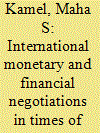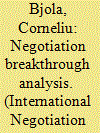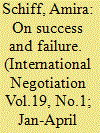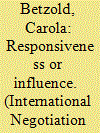| Srl | Item |
| 1 |
ID:
129051


|
|
|
|
|
| Publication |
2014.
|
| Summary/Abstract |
The G20 leaders met for their third summit in Pittsburgh in September 2009. They agreed to institutionalize the G20 as the premier forum for their global economic cooperation, shift 5% of IMF quota shares and 3% of the World Bank's shares from the overrepresented advanced countries to underrepresented dynamic-markets and developing countries, and continue with their fiscal stimuli and measures to sustain a durable global economic recovery following the global recession of 2008/09. More importantly, they launched negotiations on global imbalances within a newly formed G20 mechanism; the Framework for Strong, Sustainable and Balanced Growth. This article focuses on the financial negotiations that took place in this summit, with the aim of explaining how the aforementioned outcome was reached. It focuses on actors' negotiating strategies as an intervening variable explaining the outcome, and compares the strategies of three important actors: the United States, China and Germany.
|
|
|
|
|
|
|
|
|
|
|
|
|
|
|
|
| 2 |
ID:
129048


|
|
|
|
|
| Publication |
2014.
|
| Summary/Abstract |
Current research suggests that negotiations which are more inclusive are more likely to achieve durable peace since they speak to the entire population. One way to ensure public support is through the inclusion of civil society groups, either directly at the negotiation table or indirectly in supportive roles. It is argued that through their inclusion there is a positive effect on the legitimacy of negotiations which in turn leads to more durable peace. Nonetheless, the reasons why and how involving civil society groups improves the legitimacy of negotiations remains little understood. This article considers the gap in research by using original empirical data to look at the peace negotiations held in Liberia in 2003 and Kenya in early 2008. A theoretical model of legitimate negotiations will be used to show in what ways the involvement of civil society groups can in fact make the conduct of negotiations and the outcome of an agreement more legitimate for the aggrieved population.
|
|
|
|
|
|
|
|
|
|
|
|
|
|
|
|
| 3 |
ID:
129050


|
|
|
|
|
| Publication |
2014.
|
| Summary/Abstract |
The article addresses an important gap in the literature on climate negotiations, namely, the question of breakthroughs: what exactly counts as breakthroughs in climate negotiations, how do you measure them empirically, and what practical implications do they have for the negotiation process? To address these questions, the article draws on market trading theory and develops a framework of negotiation breakthrough analysis for defining, recognizing and measuring negotiation breakthroughs. The article argues that breakthroughs in climate negotiations occur when the outcomes breach the resistance or support level of parties' expectations regarding the results of climate talks. It concludes with a discussion of the broader contributions that technical analysis can make to the theory and practice of international negotiations.
|
|
|
|
|
|
|
|
|
|
|
|
|
|
|
|
| 4 |
ID:
129049


|
|
|
|
|
| Publication |
2014.
|
| Summary/Abstract |
This study presents a comparative analysis of two case studies in which attempts were made to resolve intractable ethno-national conflicts: the peace process undertaken in Aceh between the Government of Indonesia and the Free Aceh Movement, which led to the signing of the Helsinki Memorandum of Understanding (mou) ending the conflict in Aceh; and the process conducted in the Sri Lanka conflict from 2001 through 2004 between the Government of Sri Lanka and the Tamil Tigers, which failed to yield an agreement. The two peace processes will be examined using readiness theory, which focuses on the factors influencing the decision to enter into negotiations. This article also attempts to extend the hypotheses of readiness theory to explore the process of concession-making during the negotiations that took place in the two case studies. The findings indicate that the theory does contribute to understanding the dynamics of the pre-negotiation in both case studies and that applying its hypotheses may contribute to the understanding of the dynamics of the process of reaching an agreement in the Aceh process and of the factors leading to the failure of the negotiations in the Sri Lanka conflict. The analysis also gives rise to some questions that challenge readiness theory and its hypotheses - empirically and methodologically.
|
|
|
|
|
|
|
|
|
|
|
|
|
|
|
|
| 5 |
ID:
129046


|
|
|
|
|
| Publication |
2014.
|
| Summary/Abstract |
This article presents a contractualist approach to peace and conflict studies that grows out of classical paradigms in the field. The contractualist approach proposes a solution to intractable conflicts through processes such as a public negotiating congress to transform conflicting parties into a large peacemaking community. The vision of an ideal congress is based on the multi-party talks that had operated in South Africa and Northern Ireland during the 1990s. The challenge is to establish a similar peacemaking institution in cases such as the Israeli-Palestinian dispute where ordinary citizens are at the center of the struggle. This article includes theoretical background, analysis of relevant case studies, and lessons from the Minds of Peace Experiment, a small-scale Israeli-Palestinian public negotiating congress that has held sessions in various locations around the world.
|
|
|
|
|
|
|
|
|
|
|
|
|
|
|
|
| 6 |
ID:
129047


|
|
|
|
|
| Publication |
2014.
|
| Summary/Abstract |
This article analyzes the lobbying behavior of nongovernmental organizations (ngos) during international climate change negotiations.2 With limited resources, these ngos need to strategically invest their resources to maximize impact. A key decision concerns the target of lobbying efforts: Whom do ngos lobby, and why? Two possible explanations are contrasted: influence and responsiveness. Accordingly, ngos can focus on responsive targets that are likely to bring ngo input to the table or they can focus on influential targets whose voice is heard at the negotiation table. These two explanations are tested using data from a survey of ngos active in international climate change negotiations. I find that ngos strategically target their lobbying efforts, approaching both responsive and, more importantly, influential delegations. However, given that ngos primarily contact their home delegation, as well as the president of the negotiation session, further information on the nature and content of contacts between ngos and government delegations is necessary for understanding ngo-government interactions in international climate change negotiations.
|
|
|
|
|
|
|
|
|
|
|
|
|
|
|
|